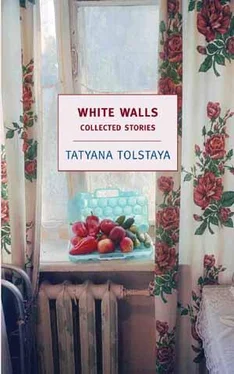His mother-in-law returned with the rolls and fresh tea, Lenochka put her hand back in its place, a used object. Lenochka was rather cool for a new bride, she smiled too politely, she burned at half-steam; and what was hidden, what thoughts flashed behind those watercolor eyes? Pale cheeks, hair like seaweed along those cheeks, weak hands, light feet—it was all enchanting, and even though Sergei basically liked his women sturdy, colorful, and black-browed, like the dolls made in Vyatka, he could not resist Lenochka’s watery charms. She entwined herself around him, not hot, her soul friable and inaccessible, with puny female problems: a cough; my shoes are too big; drive a nail in right there, Seryozha—he hammered, twisting the shoes as small as saucers in his hands, everything falls off the tiny Snow Fairy—and rubbed Lenochka’s narrow back with oil of turpentine.
He married in fear and delight, hazarding a guess, understanding nothing: neither who Lenochka was nor why he had chosen her; he’d find out with time. She was a frail girl, and he was her protector and support, and his mother-in-law was a sweet lady, amiable and tolerably silly, a home economics teacher. She taught girls to sew aprons, to bind seams, or something. Theory of sewing, the basics of fire safety. “A stitch is the intertwining of thread with fabric between two needle punctures.” “A fire is the burning of objects not intended for burning.” Cozy, feminine work. At home, there was family coziness, the family hearth, the modest and respectable space of a three-room apartment, the legacy of the severe Pavel Antonovich. The hallway was lined with books, something was always cooking in the kitchen, and beyond the kitchen was a tiny room, a cell—they always built this way, Seryozha dear, for the maids; this is where that horrible Panya lived, and Klava with the pink comb: do you want me to turn it into your study, a man needs a study of his own. Of course he liked. A small room, but totally his now—what could be better? The table by the window, the chair here, a bookshelf behind him. In the summer, poplar fluff would fly in through the window, and birdsong and children’s voices… Your hand, Maria Maximovna. Allow me to kiss it. There, isn’t everything fine?
Why, she can’t even imagine how fine it is, what a miracle, what a gift from the gods that room and that family were—for him, an orphan, a boy without a name, without a father, a mother. They invented it all for him at the orphanage: name, surname, age. He had no childhood, his childhood had been burnt up, bombed at an unknown railroad station; someone pulled him out of the fire, threw him on the ground, turning him over and over, slapping his head with a fur hat to put out the flames…. He hadn’t understood that the hat had saved him, a big black smelly hat—it knocked the memory out of him, he had nightmares about that hat, it screamed and blew up and deafened him—he had stammered a long time afterward, crying and covering his head with his hands when they tried to dress him at the home. How old had he been—three, four? And now, in the mid-70s, he, a grown man, felt his heart flipflop when he passed a store with fur hats on display. He would stop and stare, forcing himself to do it, trying to remember: Who am I? Where am I from? Whose son am I? After all, I did have a mother, someone gave birth to me, loved me, was taking me somewhere.
In the summer he played on trampled playgrounds with children just like him, burned and nameless, pulled out from under wheels. They held hands and formed two lines. “Ali Babà, hey!” “What do you say?” “Pull the line away!” “From which end of the day?” “From dawn and send Seryozha this way.” And he would run in his gray orphanage pants from one line to the other, from his family into another, to push apart the thin clasped hands, and to join them, the strangers, if he could, feeling proud of his strength yet a little treacherous too.
Long winters, hungry eyes, shaved heads, some adult giving a quick pat on the head as he ran past; the smell of mice in the sheets, the dull light. The older boys beat him, demanded that he steal for them, tempting him with a chunk of undercooked bread under his nose—we’ll share it with you, climb through that narrow window, you’re skinny, you’ll squeeze through. But someone invisible and inaudible seemed to be shaking her head, eyes closed: don’t, don’t take it. Was it his mother, giving him a sign from dark, shattered time, from the other side, beyond the hat; were incorporeal powers protecting him? He finished school and his file said: “Morally stable, orderly.” His longing for his mother, who was nowhere, ate away at him quietly. The idea that in the final analysis, everyone was descended from the apes, somehow did not console him. He invented mothers for himself, imagined himself the son of a favorite teacher—she had lost a small boy and she was looking for him, asking everyone if they had seen him. Skinny and afraid of a hat? And he, he was right there, in the front row, and she didn’t even know it. She would take a good look and cry out, “Seryozha, is that you? Why didn’t you say anything?” He was the son of the cook—he helped slice bread in the kitchen, glancing at her white cap and quick hands, trembling, waiting for the recognition to come; he stared at women in the street—in vain, they all ran past.
Now, keeping it secret from Lenochka, he wanted to be the son of Maria Maximovna. Hadn’t she had a son who burned to death in some distant, nameless railroad station? The burning of objects not intended for burning?… The cozy room beyond the kitchen, snow beyond the window, the yellow lamp shade, the old wallpaper with maple leaves, the old house—if he could only remember… Didn’t it seem as if he had lived here, as if he were recognizing something?…
Nonsense; Maria Maximovna never had a lost boy, the only thing she lost was the fur coat, a good fur coat with a silk lining embroidered with purple lilies of the valley Pavel Antonovich, a big man with a lot of stars on his uniform, took that luxurious item from a hook on a wall in a German house—he liked it and he didn’t waste time. He took it and sent it back home.
What a fur coat it had been. What a shame, Seryozha. You must know the vile feeling of being robbed. I didn’t even have time to turn around, even to gasp—they switched them. Stuck me with the cheap squirrel coat, and not even new, as I learned later: it fell apart at the seams. I think it must have been stolen. Just imagine the situation—Pavel Antonovich’s wife robbed, and wearing a stolen coat… The worst part was having to confess that I had gone to the flea market: I had done it on the sly…. Oh, it was terrible just to look at him: a geyser of anger. Robbed… He couldn’t stand things like that. He, a military doctor, an honored man who had given his whole life to science—and to people—and then something like this. People were in great awe of him then, it was later that they calumnied him, insulted him, forced him into retirement—him, such a respected specialist in infectious diseases. They forgot all his achievements, his bravery and courage, forgot how he had battled the plague in the twenties and thirties—and how he conquered it, Seryozha. Risking his life every minute. He had no patience for cowards.
It’s a horrible thing, the plague. You don’t hear too much about it nowadays, just the rare case here or there—which, incidentally, is thanks to Pavel Antonovich—but back then it was an epidemic. Infected steppes, villages, whole regions… Pavel Antonovich and his colleagues set up experiments: who is spreading the plague? All right, rats; but which kind? Just imagine; it turned out that all kinds of rats were responsible. Domestic, attic, ship, sewer, migrant rats. Moreover, all those innocent-looking bunnies, gophers, even little mice… Gerbils, hamsters, moles. Look, I couldn’t believe my ears when Pavel Antonovich told me, but he insisted: camels. Understand? You can’t trust anyone. Who would have thought? Yes, yes, camels get the plague too. And can you imagine what it’s like doing experiments on camels? Camels are huge. They had to catch one, infect it, take samples from it; and all by themselves, with their own hands. They kept it penned up, fed it, shoveled its manure. And it didn’t want to give samples, and it spat at them, too—plague-ridden spit. And it tried to hit them in the face.
Читать дальше












